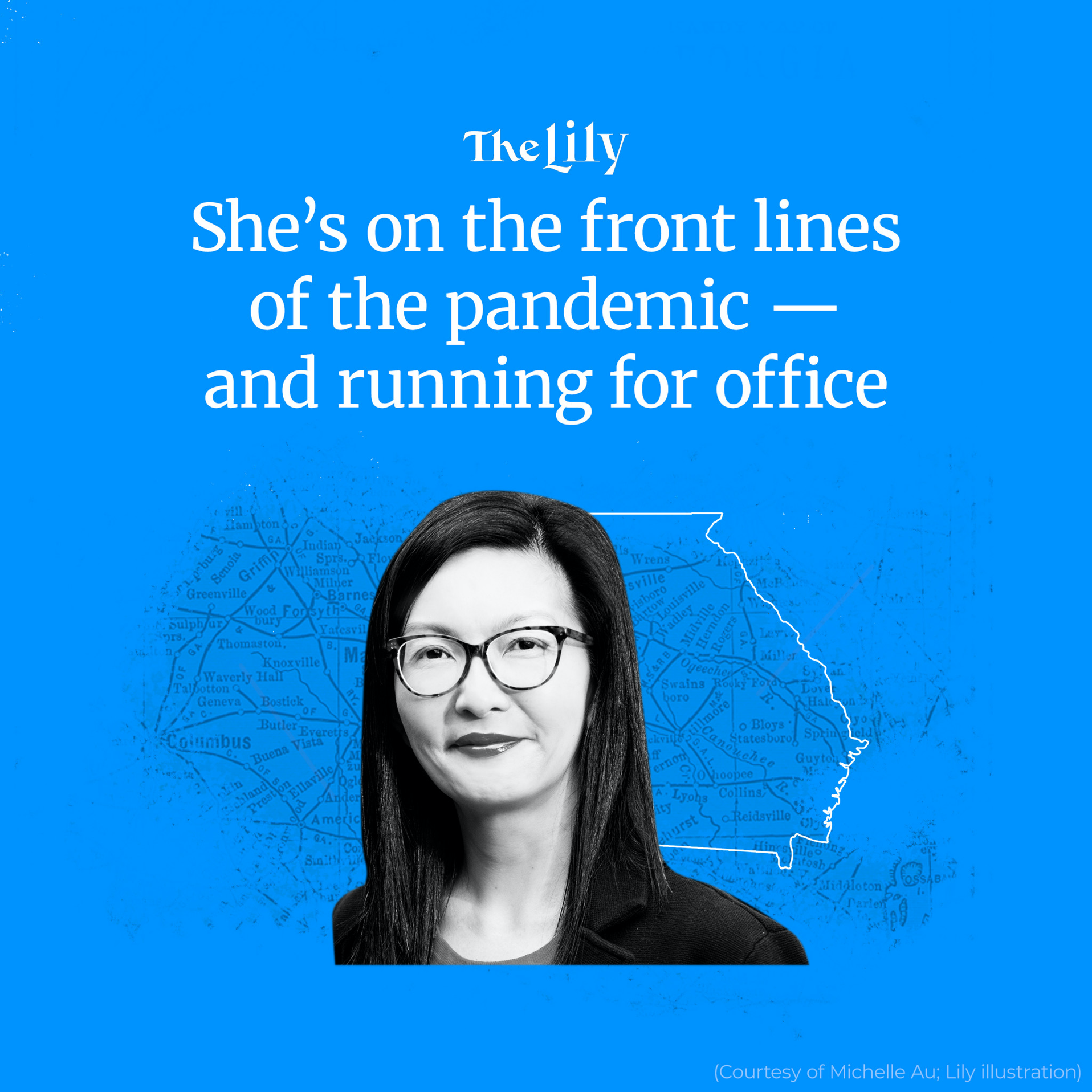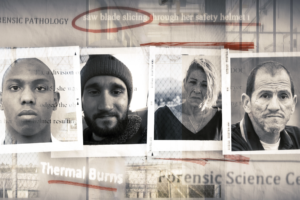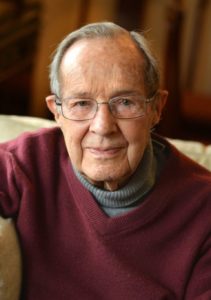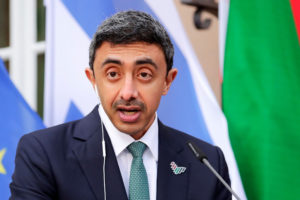A local Georgia race that hasn’t attracted much attention could make history if Michelle Au becomes the first Asian American woman to serve as a senator in the state’s legislature.
On Tuesday, Au, a 41-year old Chinese American anesthesiologist in the northern suburbs of Atlanta, won her district’s Democratic primary against 53-year-old Bangladeshi American health care entrepreneur Josh Uddin.
Technically, the state was still counting ballots on Thursday, but local media, including the Atlanta Journal Constitution, called the race for Au with 77 percent of the votes to Uddin’s 23 percent after a chaotic primary voting day that foreshadows potential problems with November’s general election.
“They’ve called the race and we feel good about where it is,” Au said.
Check out The Lily, the first U.S. newspaper for women, reinvented
If Au wins, she’ll represent a district that has become increasingly diverse over the past couple decades in a state that’s become an unexpected battleground locally and nationally.
Au will now face off against Republican attorney Matt Reeves for a seat that flipped from red to blue in 2018 and is currently held by state Sen. Zahra Karinshak.
On Thursday, she took the day off and went berry picking with her children before talking to The Lily about her public policy goals, running for office as a Chinese American during a pandemic and her foray into making comics.
This interview has been edited for length and clarity.
Soo Youn: Your campaign has put public health front and center. Are there particular issues in Georgia that you think need to be addressed first?
Michelle Au: Georgia is one of the few states that still refuses to expand Medicaid under the ACA [Affordable Care Act]. Now we’re in a pandemic and we came into this pandemic with a sicker population because we didn’t have wider access to health insurance, and with a more uninsured population. So that makes our state uniquely vulnerable to some of the more serious effects of the coronavirus. On top of that, a lot of people have lost their jobs because we’re in this economic downturn so more people would qualify for Medicaid or have lost employer-based health insurance because of the second condition.
While it was something that I was pushing before the epidemic, now it seems like it’s just a no brainer, right? We have this budget shortfall in the state. We have people who are hurting in the midst of an epidemic who don’t have health insurance. This is something that is available to us. It’s federal taxes that we’ve already paid that are waiting to come back [to Georgia] to help our people.
SY: Everyone’s having a hard time balancing these days. You’re a front line worker during a crisis, you’re married and you have three children. How are you managing?
MA: The good thing about being a working mom who works in medicine is that you’re very accustomed to this practice of triage, right? You’re not going to be able to do everything at once. So it’s really just a matter of, what is the most urgent thing that I need to do right now? And the thing is going to change depending on the day and the time of day and what’s happening now.
So when I’m at work I’m very accustomed to focusing on my work because I’m taking care of patients. That is my most important need in that moment. When I’m home, if my kids need something that is most important in that moment. But these things change and you have to shuffle it around.
Adding a campaign to that, it’s just another thing to triage but it’s not outside the realm of what I’ve had to deal with in the past. I have a very high threshold for stress.
It would be easy to think: this is too much to handle. But for me, it [coronavirus] made it even more obvious why we need medical voices and public health expertise in the legislature. So as opposed to being an onerous extra burden, it sort of gives you a little bit more purpose and a little more clarity.
SY: You’re married to another doctor, right?
MA: Yes he is an ophthalmologist. He’s an ocular plastic surgeon. There was a study done that the three highest risk specialties in medicine for contracting coronavirus are: emergency medicine, anesthesiology — which is what I do — and ophthalmology, which is what my spouse does. It’s like, “We’ll just not read this article right now.” Because there’s nothing you can do about it. You still have to do your job. It never crosses your mind to not take care of your patients.
SY: I read that you were living in the basement with a separate bedroom and bathroom. Are you still doing that?
MA: I’m still doing it. Our philosophy for doing that is that we don’t want to cross contaminate because we need one adult standing.
On the chance that one of us picks up this virus we want to have at least some semi-level of quarantine in this house. So I’m still sleeping in the basement. I have a separate bathroom. The kids are not allowed in my area.
Which is not to say I’m not with them, because I still take care of them during the day. I still make dinner for them. The American Medical Association has recommended this sort of semi-quarantine condition. Some people have gone much further than that — their families have moved out of the house or they moved out of the house, especially in New York when it was at its peak.
But the AMA acknowledges this is a very stressful time for health care practitioners. So to preemptively isolate yourself from your family when you may need family support the most may be bad from other public health standpoints. So they recommended basically what we’re doing, if possible: separate sleeping areas, separate bathroom, don’t share plates and cups.
I don’t know if it’s enough. I don’t know if it’s too much. But you do what you can control, because there’s so much that we can’t control and so much that we don’t know.
We are in high-risk fields. I try not to let my kids know this because they don’t need that stress and they can’t do anything about it, but you’re aware that you’re the one who would be bringing it into this house. So I do all my laundry. I don’t let my kids in my car anymore because I drive my car to work so they consider that car contaminated. Nothing from work enters this house.
SY: Why run for office?
MA: After the election season in 2016 I felt whatever I was doing in my daily life, despite it being very rewarding — I love taking care of patients — I felt like maybe I wasn’t doing enough.
I’m a physician. So what can I do that uses these skills to take care of more people? The natural thing was to get a public health degree, because public health concentrates a lot on community-based health or population-based health, whereas in clinical medicine you’re taking care of one patient at a time, which, again, is very rewarding, but I was like: I want to do more at once.
So I got a public health degree from Columbia. It taught me a lot about the things that I felt I should have learned in medical school.
It’s almost not even the fault of medical school, because there’s so much you have to learn and you only have four years, so they really try to pick and choose the most important things. But learning about health care policy, health care law, health care economics, the history of how Medicare and Medicaid came to be — all these things that I realize that I’ve been living with for my entire career and completely underlines the system in which I worked. And I had not known about it.
The most popular and interesting stories of the day to keep you in the know. In your inbox, every day.
You get all this information and you’re like: Wow, I really feel like I see how the system works, now I see how all the pieces fit together. And you think, “Well, now what do I do?”
A lot of the levers that control population health and health care policy, you have to move at the legislative level. Upon realizing that, and seeing that there isn’t that much representation from medical professionals and public health professionals in the legislature, you feel a responsibility to be that person in some way.
Doctors take an oath and the oath is first do no harm, right? Often people see that they think about active harms like surgical injury or medication error.
But I started thinking about it in terms of passive harms. If you have this knowledge and this desire to help and you don’t do it, then that’s a passive harm. Because you could be helping people and you are choosing to step back or to choose an easier path for yourself. So it became a sense of responsibility. You went to fulfill your full potential and to give your community the value of whatever you can bring to the table. So that’s part of why I decided to run.
SY: I don’t want to be presumptuous, but we’re about the same age and I’m also Asian. I don’t assume everyone’s the same, but I could see Asian parents saying: You have a good life, you’re a doctor, you have a family — why would you want the stress and lack of privacy of getting involved in politics? Was your family supportive?
MA: I’ve definitely heard that point of view from a lot of people.
Growing up, I never saw any Asian people in politics. It just wasn’t a thing. It wasn’t something that Asian families push their kids to do.
But I think part of that is because we don’t have this model, and we don’t see faces that look like ours in the legislature. So it’s not even something we consider. If I had seen an Asian state Senator as a kid, I would have been like, “What?”
It just seems like it wasn’t for us.
Now I have my own kids. My husband is Caucasian American, but my kids are half-Asian and strongly identify as Asian. You think about what you want to present to them and what kind of a world you want them to see and what kind of opportunities you want them to be able to consider openly for themselves.
You feel this representation is important. And if you have that desire, to step up and be that person. And I understand not wanting to step up because it is a lot and there’s a lot of exposure and it probably does seem thankless for a lot of people.
But if you do have the desire to do it that it is your responsibility, not just to do the work but to show other people this is the path for them. So I feel a lot of responsibility in that sense too, because I’ve had a lot of Asian families come up to me and say, “You know we came here so that we could give our kids this kind of life that you’re modeling. Not just that you’re a doctor, but just that anything is possible.”
Can you imagine coming here, and in one generation your kid being able to run for office? That’s like beyond their imagination. But to show that it’s possible really is powerful.
Even though I thought my parents would be kind of [upset] at me because they’d be like, “Don’t you have a good life?” they were floored. They really feel that sense of, “We came here so that you could have these opportunities.” This is why people come to this country because it’s like the possibilities are endless. To them it’s just exactly the American Dream they came here for.
So I was surprised. I was a little worried about telling them but they feel really proud.
SY: If it were up to you, would Georgia be reopen now? You don’t have to pinpoint an exact date to reopen but what would it look like today?
MA: I think Georgia would be reopened in a phased way. I think you have to prioritize what needs to open first — I do look to the very data-driven model that Gov. Cuomo has been putting out in New York and that they have really been following their case data to the point that … you know the World Health Organization recommends a less than 5 percent positive rate and viral testing before considering reopening and I’m certain Georgia wasn’t doing that, but you do have to balance different things.
I’m not saying I necessarily would have not reopened when the governor did. I think I would have, however, made a stronger effort to increase the data to feel confidence that these decisions were right. So I think that especially early on, we lacked in some of our testing. We have caught up to a large degree since then but to have that in place before you make the decision I think would have been important. So it’s not necessarily that I think that the decision was purely wrong as such. It’s just, you would like to have a little bit more data before you make decisions.
SY: I saw someone mention you in a tweet about comics. Did you use to write comics?
MA: I did. I’ve done a couple of different things. Well, when I was at Wellesley I had a weekly comic strip in the newspaper. And after I graduated went to med school I started doing a medical comic strip just for fun. It was therapeutic for me.
People seem to like it because — medical education is ludicrous, so to be able to just make it overtly ludicrous on paper I think was helpful.
SY: What was it called?
MA: The comic strip was called Scut Monkey because when you’re a medical resident you do scut. It’s just mindless work. I don’t even know if it’s a medical term or if it’s like a regular people term. Scut Monkey is what we used to call ourselves in residency. Like, “Well, I’m just being a scut monkey right now because I’m checking all these labs and I’m changing all these dressings” and it was just stuff that residents do.




